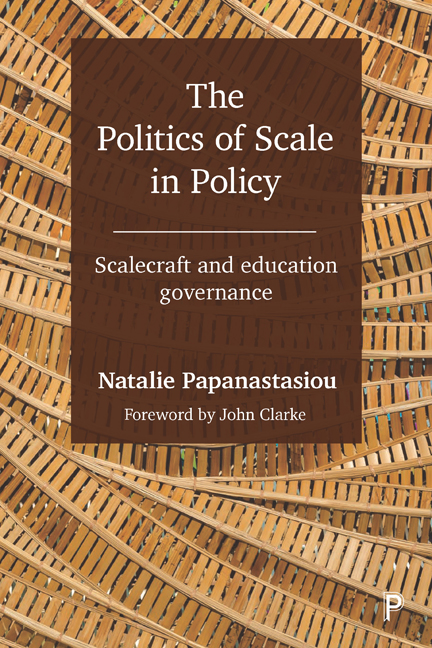Book contents
- Frontmatter
- Contents
- About the author
- Foreword
- Preface and acknowledgements
- 1 Policy, scale and the importance of space
- 2 Problematising scale in the study of policy
- 3 Exposing scale hegemonies
- 4 Knowledge, policy and scale
- 5 Hegemonies of statecraft and scale
- 6 Spatial entrepreneurs and scalecraft
- 7 The practice of scalecraft
- References
- Index
4 - Knowledge, policy and scale
Published online by Cambridge University Press: 27 April 2022
- Frontmatter
- Contents
- About the author
- Foreword
- Preface and acknowledgements
- 1 Policy, scale and the importance of space
- 2 Problematising scale in the study of policy
- 3 Exposing scale hegemonies
- 4 Knowledge, policy and scale
- 5 Hegemonies of statecraft and scale
- 6 Spatial entrepreneurs and scalecraft
- 7 The practice of scalecraft
- References
- Index
Summary
The relationship between knowledge and policy is unquestionably a major line of inquiry for policy scholars, and it is a research area which has produced an expansive and diverse literature. The traditional dichotomy between knowledge and power – which suggests that knowledge is produced ‘outside’ the world of politics – is now widely challenged in the policy literature (Radaelli, 1995) and approaching knowledge as an endogenous feature of policy is a well-established theoretical position in policy studies. The wide range of approaches developed to examine the power and politics produced during the interactions between knowledge and policy – from studies of evaluation, epistemic communities, policy learning, policy diffusion and agenda-setting to name a few – continue to diversify, and serve to highlight how this continues to be a major issue of contemporary policy studies (Freeman and Sturdy, 2014a).
This chapter draws inspiration from the body of work which understands knowledge and policy to be in a constantly evolving relationship of co-production. This position has been particularly advanced by the pioneering work of Sheila Jasanoff (1987; 2004) who has problematised the distinction between science and policy and has shown that any apparent boundary between these two concepts is socially constructed and constantly subject to contestation. Jasanoff's arguments have had a huge impact outside the area of science and technology studies, and have been adopted by a wide range of policy scholars focusing on the role of knowledge beyond the field of ‘science’ as a way of understanding the role of knowledge in policy (for example, Fischer, 2009; Freeman and Sturdy, 2014b; Hajer, 1997).
Taking inspiration from this approach and integrating it with the political discourse theory perspective adopted in this book, knowledge and policy can be characterised as having a co-constitutive relationship whereby the two are impossible to be prised apart. Political discourse theory takes a particular interest in hegemonies of knowledge, which it understands as being normalised, powerful ways of thinking about knowledge or taken for granted ‘ways of knowing’ in policymaking. Examples of hegemonic knowledge regimes in the practice of policy would include ‘evidence-based policymaking’, the importance of learning from abroad, and isolating key variables to find out ‘what works’.
- Type
- Chapter
- Information
- The Politics of Scale in PolicyScalecraft and Education Governance, pp. 47 - 68Publisher: Bristol University PressPrint publication year: 2019

